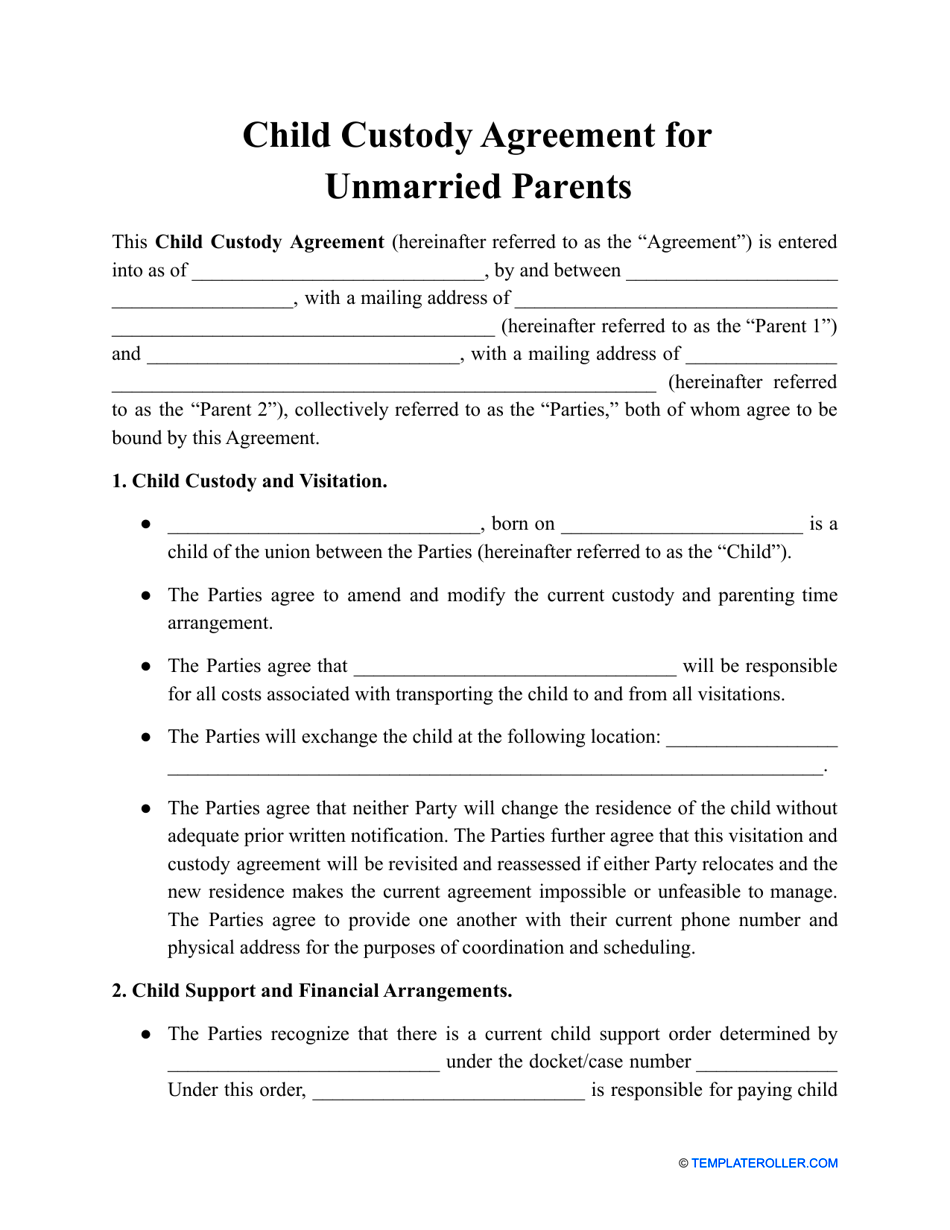Massachusetts Custody Laws for Unmarried Parents
Figuring out custody laws can be challenging, especially for parents who aren’t married. In Massachusetts these laws focus on what’s best for the child but they can get tricky and differ based on your circumstances. Whether you’re looking to set up custody or want to know your rights it’s essential to have a solid understanding of the legal framework. This piece aims to provide insights into custody laws in Massachusetts assisting you in making choices and navigating the process with compassion and transparency.
Introduction to Custody Laws in Massachusetts

Custody laws in Massachusetts are designed to prioritize what is best for the child, regardless of the parents marital status. The state treats both married and unmarried parents equally when it comes to custody matters. The main goal is to provide children with nurturing and stable environments. It’s crucial for parents seeking custody or visitation rights to grasp this framework. The legal system takes an approach, considering factors in each case to make decisions that best support the child’s needs and overall well being.
Key Factors Affecting Custody Decisions

When deciding on custody arrangements Massachusetts courts take into account various factors to prioritize the well being of the child. Let’s delve into some of the key aspects that are considered.
- Child’s Well-being: The court prioritizes the emotional, physical, and developmental needs of the child. A stable environment, consistent routines, and the child’s relationship with each parent are crucial.
- Parental Involvement: Courts assess the involvement of each parent in the child’s life. This includes day-to-day care, involvement in education, and participation in extracurricular activities.
- Parenting Capacity: The ability of each parent to provide a nurturing, safe environment is examined. This includes evaluating their mental and physical health, as well as their ability to meet the child’s needs.
- Child’s Preferences: Depending on their age and maturity, a child’s preferences may be considered. Older children, particularly teenagers, might have a say in their living arrangements.
- Historical Care: The court looks at the historical caregiving roles of each parent. If one parent has been the primary caregiver, this might influence the decision.
When considering these factors it’s crucial to be transparent and prioritize the well being of the child. Judges recognize the significance of emotions at play and aim to make choices that create a nurturing and encouraging atmosphere for the child.
Types of Custody Arrangements in Massachusetts

When dealing with custody arrangements in Massachusetts it’s important to grasp the various custody types that may be offered. Each setup comes with its own intricacies tailored to the specific family situation. Whether you’re a parent aiming to do what’s best for your child or just trying to navigate the legal choices understanding these arrangements can provide clarity in your decision making process.
In Massachusetts custody is typically categorized into two primary forms.
- Physical Custody: This refers to where the child will live and who will be responsible for day-to-day care. Physical custody can be sole or joint. In sole physical custody, the child lives primarily with one parent, while the other may have visitation rights. Joint physical custody means the child spends significant time with both parents, though not necessarily equally.
- Legal Custody: Legal custody involves the right to make significant decisions about the child’s life, including education, health care, and religious upbringing. Like physical custody, legal custody can be sole or joint. In sole legal custody, one parent makes these decisions alone, whereas joint legal custody involves both parents in decision-making.
In addition Massachusetts courts have the ability to establish different tailored arrangements such as
- Visitation Schedules: These are detailed plans outlining how and when the non-custodial parent will see the child. This can include weekends, holidays, and vacations.
- Shared Parenting: This involves a more balanced approach where both parents share responsibilities and time equally, aiming for an arrangement that works best for the child’s development.
Every setup is designed to meet the childs requirements taking into account the realities of each parents situation. It can be beneficial to talk about these choices with a legal expert who can offer personalized advice based on your unique situation.
Legal Rights of Unmarried Parents
Navigating parenthood as an unmarried individual in Massachusetts involves specific legal aspects and entitlements. Its important to grasp these rights whether you’re working towards custody or aiming to play a part in your child’s life. Drawing from my experiences I’ve witnessed the significance of unmarried parents being proactive and well informed about their rights.
Here are some important legal rights for parents who are not married in Massachusetts:
- Custody Rights: Both unmarried parents have the right to seek custody of their child. The court will consider both parents’ abilities to provide for the child’s needs when making custody decisions.
- Visitation Rights: Unmarried parents who do not have physical custody can still have visitation rights. These rights are designed to ensure that the non-custodial parent maintains a meaningful relationship with the child.
- Child Support: Unmarried parents are also subject to child support obligations. This means that both parents are financially responsible for supporting their child, regardless of custody arrangements.
- Decision-Making Rights: If granted legal custody, unmarried parents have the right to make significant decisions about their child’s upbringing. This includes decisions regarding education, health, and religion.
It’s crucial to establish these rights through processes to ensure they are acknowledged and upheld. Legal systems typically necessitate a well defined agreement to avoid misinterpretations and safeguard the welfare of the child.
Steps to Establish Custody Rights
Navigating the process of securing custody rights especially for parents can be quite a challenge. However from what I’ve seen approaching each step with care and consideration can greatly impact the results for both you and your little one.
Here is a breakdown of the process to establish custody rights in Massachusetts
- File a Complaint: Begin by filing a complaint for custody in the appropriate Massachusetts court. This legal document outlines your request and the reasons for seeking custody.
- Serve the Other Parent: Ensure that the other parent is properly notified of the custody action. This involves serving them with the necessary legal documents, which informs them of the proceedings and allows them to respond.
- Gather Evidence: Collect and prepare evidence that supports your case. This can include documents related to your child’s needs, your involvement in their life, and any other relevant information.
- Attend Mediation: Massachusetts courts often require mediation to help parents reach an agreement without going to trial. Mediation provides a platform to discuss and negotiate custody arrangements amicably.
- Court Hearing: If mediation does not resolve the issue, a court hearing will be scheduled. During this hearing, both parents present their cases, and the judge makes a determination based on the evidence and the child’s best interests.
- Receive a Custody Order: Once the court has made a decision, a custody order will be issued. This legal document outlines the custody arrangement and any visitation schedules.
- Follow Up: Adhere to the custody order and maintain open communication with the other parent. If changes are needed, you may need to return to court to request modifications.
While these steps may be tough they aim to uphold fairness in custody arrangements prioritizing the welfare of the child. It’s important to tackle this journey with patience and determination and it might be beneficial to seek guidance to navigate the intricacies of family law smoothly.
How the Court Determines Custody
Figuring out how a court decides on custody matters can feel like piecing together a jigsaw puzzle. After seeing many families navigate this journey I can assure you that the courts main priority is always the welfare of the child. The process can be thorough and highly individualized showing the courts dedication to making choices that genuinely serve the child’s best interests.
Lets take a glance at the important aspects that the court takes into account when making custody decisions.
- Best Interests of the Child: This is the cornerstone of any custody decision. The court evaluates what arrangement will best support the child’s emotional, psychological, and physical needs. This can include considering the child’s age, their relationship with each parent, and their overall stability.
- Parental Fitness: The court assesses each parent’s ability to provide a safe and nurturing environment. This includes examining factors like each parent’s mental and physical health, their lifestyle, and their parenting capabilities.
- Parent-Child Relationship: The nature of each parent’s relationship with the child is crucial. Courts look at who has been the primary caregiver, who is more involved in daily activities, and the emotional bond between the parent and child.
- Parent’s Work Schedules: The court considers how a parent’s work schedule will impact their ability to care for the child. Consistency and availability are key components of a stable environment.
- Child’s Preferences: For older children, their preferences might be taken into account. While not determinative, their wishes can provide insight into what arrangement might work best for them.
In this journey the judicial system aims to strike a fair balance between the rights of parents and the needs of a child. Its an introspective endeavor focused on ensuring a supportive setting for the childs development.
Modifying Custody Orders
Life can be full of surprises and there are times when changes in situations require us to adjust custody orders. Based on what I’ve seen and gone through I’ve noticed that this process can be tough yet it’s essential to make sure that custody arrangements still prioritize the well being of the child as circumstances change.
Here’s an overview of how changes to custody arrangements typically function.
- Filing a Motion: To request a modification, you need to file a motion with the court. This motion should detail the changes in circumstances that justify a modification. Examples might include a parent relocating, changes in a parent’s work schedule, or significant alterations in the child’s needs.
- Show Changed Circumstances: The court requires evidence of a substantial change in circumstances since the last custody order. This might include evidence of a parent’s new job, a change in living conditions, or changes in the child’s needs or preferences.
- Best Interests of the Child: Just like in initial custody decisions, any modification must be in the best interests of the child. The court will evaluate how the proposed changes will impact the child’s well-being, stability, and overall happiness.
- Mediation: Often, the court may suggest or require mediation to resolve the issues without a full court hearing. Mediation provides a platform for both parents to discuss and negotiate modifications amicably.
- Court Hearing: If mediation does not lead to an agreement, a court hearing will be held. During this hearing, both parents will present their case, and the judge will decide based on the presented evidence and the child’s best interests.
Changing custody arrangements can be a move but it’s crucial for adjusting to life’s shifts while prioritizing the child’s welfare.
Common Challenges and Solutions
Custody disputes and arrangements bring their own unique difficulties. Looking back on personal anecdotes and experiences I’ve witnessed families tackle these obstacles with strength and perseverance. Recognizing the challenges and practical approaches can ease the path for all parties, involved in the process.
Here are a few obstacles that people often face along with suggestions on how to overcome them.
- Communication Issues: Effective communication between parents is vital but often difficult. To address this, consider using co-parenting apps or tools designed to streamline communication and share schedules, decisions, and updates about the child.
- Emotional Stress: Custody disputes can be emotionally draining. It’s important to seek support from friends, family, or a counselor. Managing your own emotional health will help you approach the situation with a clearer mind.
- Inconsistent Parenting Styles: Differing parenting styles can lead to conflicts. Establishing clear, consistent rules and routines that both parents agree on can help bridge this gap. Open, honest discussions about parenting approaches can also foster mutual understanding.
- Financial Strain: Legal proceedings can be expensive. Consider seeking legal aid or pro bono services if cost is a concern. Additionally, try to work out agreements amicably to reduce the financial burden of prolonged legal battles.
- Unresolved Disputes: Sometimes disputes remain unresolved. In such cases, returning to mediation or seeking the guidance of a family therapist might help address lingering issues and find workable solutions.
Taking a proactive and collaborative stance when dealing with these obstacles can alleviate the pressure on both parents and kids resulting in custody arrangements that are more fair and efficient.
Frequently Asked Questions
Dealing with custody laws and processes can raise a lot of queries, particularly for parents who are venturing into this legal realm for the first time. Drawing from numerous discussions and encounters I’ve put together a list of questions I often come across along with clear cut responses to shed light on the procedure.
- Can an unmarried parent get custody of their child in Massachusetts? Yes, unmarried parents can seek custody just like married parents. The court evaluates the situation based on the child’s best interests, considering factors like the child’s needs, the parents’ involvement, and the stability each parent can provide.
- How is child support determined for unmarried parents? Child support in Massachusetts is determined by guidelines that take into account both parents’ incomes, the amount of time each parent spends with the child, and other relevant factors. The goal is to ensure that the child’s financial needs are met adequately.
- What should I do if I disagree with a custody arrangement? If you disagree with the custody arrangement, you can request a modification by filing a motion with the court. You may need to provide evidence of a substantial change in circumstances that justifies the modification.
- How does the court decide between joint custody and sole custody? The decision depends on various factors, including the parents’ ability to cooperate and communicate, the child’s adjustment to their current living situation, and each parent’s ability to meet the child’s needs. The court aims to choose an arrangement that provides the most stability and support for the child.
- What role does mediation play in custody disputes? Mediation is a process where a neutral third party helps parents negotiate and reach an agreement on custody and other issues. It can be a less adversarial way to resolve disputes and often helps both parents find common ground more efficiently.
These frequently asked questions address key aspects of custody regulations and procedures. Nonetheless every case is different making it valuable to seek guidance from a legal expert for tailored assistance and support.
Conclusion and Final Thoughts
Navigating the intricacies of Massachusetts custody laws as an unmarried parent can be quite a challenge. However by familiarizing yourself with the different custody options, legal entitlements and the procedures for establishing or adjusting custody you can better navigate this journey. It’s important to prioritize the childs well being and create a nurturing environment. Approach the process with patience seek assistance when necessary and always keep your childs best interests in mind.


